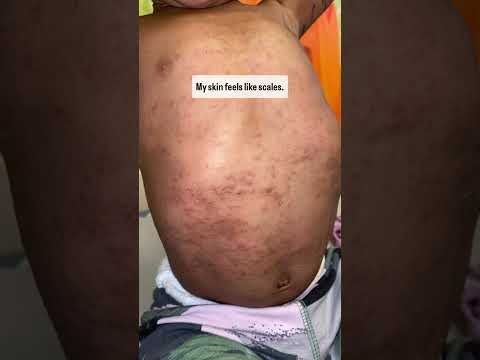As part of its extensive offerings for the eczema community throughout October, NEA hosts “The Ecz-hibition,” a social media-driven awareness campaign featuring photos of eczema flares paired with original poems
NOVATO, Calif., Sept. 30, 2024 /PRNewswire/ — The National Eczema Association (NEA) presents its annual Eczema Awareness Month (EAM) throughout October to spread awareness about living with eczema—the life-altering and non-contagious skin disease that affects 31.6 million people in the United States..
Eczema refers to a group of inflammatory skin conditions that cause dry skin, itchiness, rashes, scaly patches, blisters, and skin infections. Eczema’s disease burden includes significant physical, mental, and emotional impacts.
Eczema facts reveal various serious effects on patient health, well-being, and quality of life. For example:
- Severe eczema comes with additional complications beyond itchy skin and rashes and can lead to hospitalization if left untreated.
- People with eczema are at higher risk for food allergy, asthma, hay fever, depression and anxiety.
- Half of patients with moderate to severe AD indicate that it significantly limits their lifestyle; nearly 35% of those with mild AD also experience some lifestyle limitations.1
- More than 55% of adults with moderate to severe AD report inadequate disease control.2, 3, 4
- Nearly 40% of school-aged children and teens with AD have experienced bullying because of their disease.5,6,7
This year’s awareness campaign puts eczema on display with photos of real, up-close photos of community members’ flares, paired with their original poems reflecting their lived experiences. Themed, “The Ecz-hibition,” this powerful social media campaign aims to bring greater attention to and understanding about eczema’s vast impacts, while also working to reduce stigma and foster compassion.
Eczema Awareness Month Weekly Themes
Each week of the 2024 Eczema Awareness Month will look at #EczemaonDisplay as follows:
Week 1 – Blank canvas: What is eczema?
This week looks at eczema’s complex pathophysiology, various types and diverse appearances.
Week 2 – Art Theory: Eczema is more than the visuals
This week looks at eczema’s burden of disease.
Week 3 – Art class: creative ways to manage your eczema
This week takes a closer look at how to manage and treat eczema — and what future treatment and management might look like.
Week 4 – Art supplies: tools for living your most ecz-pressive life with eczema
This week looks at the resources available to people with eczema to help them live their best lives, whether or not they’re flaring.
Week 5 – Artist‘s collective: The eczema community is here to inspire you
This week shares advice and inspiration from the eczema community to remind people with eczema that they are not alone.
Offerings include an array of virtual events featuring NEA’s ecz-perts and community members, educational resources, social media content and engagement, and support for patients and caregivers.
For people in the San Francisco Bay Area, NEA will present its first-ever pop-up gallery in honor of Eczema Awareness Month, showcasing the Ecz-hibition’s images and poetry. The exhibit will be on display at the Problem Library, 1288 15th Ave, San Francisco from October 1-7 during these times:
Tuesday, 10/1, Wednesday, 10/2, and Thursday, 10/3: 10am–4pm
Friday, 10/4: 10am–8pm
Saturday, 10/5, Sunday 10/6, and Monday, 10/7: 10am–4pm
The eczema landscape has been changing dramatically in recent years, and for eczema sufferers and their loved ones, the future looks very promising. “As our understanding of this complex disease continues to grow with the surge in scientific research, discovery, and insight, we anticipate improved therapies, care and outcomes for patients, and one day, potentially, a cure for eczema,” comments Kristin Belleson, NEA President and CEO.
NEA’s Eczema Awareness Month 2024 is supported in part by the following sponsors:
AbbVie, LEO, Lilly, Sanofi and Regeneron, Dermavant, Incyte, Pfizer, All Free and Clear, Amgen and Kyowa Kirin, Arcutis, Mustela, Bioderma, and ShiKai.
To learn more, visit eczemamonth.org.
About the National Eczema Association
Founded in 1988, the National Eczema Association (NEA) is a 501(c)(3) nonprofit and the largest patient advocacy organization serving the over 31 million Americans who live with eczema and those who care for them. NEA provides programs and resources to elevate the diverse lived experience of eczema, and help patients and caregivers understand their disease, actively engage in their care, find strength in one another — and improve their lives. Additionally, NEA advances critical eczema research and partners with key stakeholders to ensure the patient voice is represented and valued in education, care and treatment decision-making. Learn more at NationalEczema.org.
References
1. Silverberg, J. I. et al. Patient burden and quality of life in atopic dermatitis in US adults: A population-based cross-sectional study. Ann. Allergy Asthma Immunol. 121, 340–347 (2018).
2. McCleary, K. K. More Than Skin Deep ‘Voice of the Patient’ Report. (2020).
3.Simpson, E. L. et al. Association of Inadequately Controlled Disease and Disease Severity With Patient-Reported Disease Burden in Adults With Atopic Dermatitis. JAMA Dermatol. 154, 903–912 (2018).
4. Wei, W. et al. Extent and consequences of inadequate disease control among adults with a history of moderate to severe atopic dermatitis. J. Dermatol. 45, 150–157 (2018).
5. Halvorsen, J. A., Lien, L., Dalgard, F., Bjertness, E. & Stern, R. S. Suicidal ideation, mental health problems, and social function in adolescents with eczema: a population-based study. J. Invest. Dermatol. 134, 1847–1854 (2014).
6. Stingeni, L. et al. Atopic Dermatitis and Patient Perspectives: Insights of Bullying at School and Career Discrimination at Work. J. Asthma Allergy 14, 919–928 (2021).
7. Magin, P., Adams, J., Heading, G., Pond, D. & Smith, W. Experiences of appearance-related teasing and bullying in skin diseases and their psychological sequelae: results of a qualitative study. Scand. J. Caring Sci. 22, 430–436 (2008).
SOURCE National Eczema Association

WANT YOUR COMPANY’S NEWS FEATURED ON PRNEWSWIRE.COM?
440k+
Newsrooms &
Influencers
9k+
Digital Media
Outlets
270k+
Journalists
Opted In

